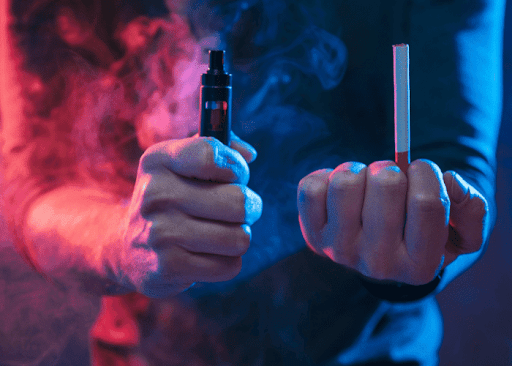Have you ever wondered what happens when nicotine gets into your brain circuit? Nicotine is that sneaky little chemical found in tobacco products. It's abundant in cigarettes, nicotine patches, vapes, e-cigarettes, gum, and even some so-called “herbal” products.
Understanding how nicotine affects the brain is vital. Let’s break down exactly what this chemical does to the human brain and why a nicotine-free lifestyle matters.
The Human Brain and Nicotine: A Biological Overview
How exactly does nicotine affect the brain? It all starts with these tiny protein structures called nicotinic acetylcholine receptors. According to the Pharmacological Reviews journal, nicotinic acetylcholine receptors naturally exist in your central nervous system to help regulate alertness, attention, and memory. When nicotine enters this system, it hijacks those receptors and triggers a rush of dopamine, the "feel-good" neurotransmitter.
Don’t let that dopamine hit fool you. This is what is happening behind the scenes:
- Nicotine Mimics the Brain’s Natural Chemical Acetylcholine: It binds to the same receptors as acetylcholine in high-sensitivity brain regions like the prefrontal cortex (decision-making HQ) and ventral tegmental area (reward center).
- Nicotine Rewires the Reward Center: This interaction reinforces a pattern of reward-seeking behavior that becomes hard to shake, resulting in a cycle of dependence.
- Nicotine Changes the Brain: Repeated nicotine exposure increases receptor density, making the brain crave more nicotine just to feel "normal."

Effects of Nicotine on Brain Development and Cognitive Function
When you're young, you're in a critical period of brain development. That’s when things like memory, decision-making, and impulse control are still wiring up. When you add cigarette smoking and nicotine exposure into this mix, it mimics your brain's natural chemical processes and disrupts cognitive function. Long-term nicotine exposure messes with how your brain actually works and results in cognitive impairment. Scientists and neurologists have been noticing:
- Effects on Memory: Young adults who enjoy cigarette smoking and have frequent nicotine exposure show long-term damage to brain functions, especially in areas linked to working memory and cognitive control.
- Effects on Learning Abilities: Nicotine disrupts synaptic plasticity, which is just a fancy term for how your brain strengthens and builds new connections. That is, the building blocks of learning and growth.
- Effects on Impulse Control: Major consequences include poor impulse control, mood swings, and difficulty focusing. These are all symptoms tied to altered cognitive processes.
Note that these effects are not temporary. Even after someone stops using nicotine, their cognitive deficits can hang around, sometimes permanently. That’s why switching to something that’s completely nicotine-free matters more than ever among young adults with major brain milestones ahead of them.
Nicotine Dependence and the Chronic Nature of Addiction
Nicotine addiction is a full-on brain-level takeover. When you use tobacco or nicotine products regularly, your brain adjusts its chemistry to expect that hit. Over time, this leads to nicotine dependence, where your system literally craves this substance to function normally. Dependence is especially strong with tobacco smoking, but vapes are right up there also, due to how fast nicotine gets absorbed.
According to reports from the Centers for Disease Control and Prevention (CDC) and the Pharmacological Reviews journal:
- Tobacco Dependence is Chronic: Nicotine addiction is now widely recognized as a chronic relapsing disease, meaning it’s hard to quit, and it’s expected that users will relapse several times.
- Reward Processing Reinforces Addiction: This is tied to the brain’s reward processing pathways and positive reinforcement. Basically, your brain learns to associate stress relief, focus, or even just boredom with a nicotine hit.
- Cognitive Damage Occurs Over Time: Nicotine dependence can cause real issues like difficulty concentrating, mood swings, and deeper cognitive deficits.
A lot of this research comes from animal studies. For example, a study using rat hippocampus models (the brain’s memory hub) in Frontiers in Molecular Neuroscience by Lucente et al. has shown that nicotine shrinks neurons and messes with areas of information storage.
These effects are worse in younger animals, showing just how sensitive the developing brain is to chemical interference. In fact, even control animals (the ones that didn’t get nicotine) performed better in memory tests, showing that nicotine levels directly alter mental outcomes.

Mental Health Implications of Nicotine Exposure
You might have been told that nicotine would calm you. That’s the trick it sells. The fact is that chronic nicotine exposure can impact mental health.
A 2023 American Heart Association (AHA) survey of more than 2,500 teens and young adults found a significant connection between nicotine use, the adolescent brain, and increased symptoms of anxiety and depression. This is because:
- Nicotine Messes Up How You Feel: It gets in the way of neurotransmitters like dopamine and serotonin, which regulate mood. At first, it might seem like it makes you feel relaxed, but over time, it can worsen mood disorders.
-
Nicotine Aggravates Psychiatric Disorders: Those with pre-existing psychiatric disorders, such as anxiety disorders, are more prone to developing an addiction to nicotine. The higher their consumption, the worse their symptoms. Researchers who studied the relationship between brain functions and long-term nicotine use also found:
- An increased risk of Alzheimer's disease.
- Major drops in cognitive processes like attention span and multitasking among adults who exposed their adolescent brain to nicotine.
- Nicotine Interferes With Focus: There’s growing evidence linking nicotine to attention deficit hyperactivity disorder (ADHD). People with ADHD symptoms may turn to nicotine as a focus tool. However, it creates a toxic loop of relief followed by a crash.
Even worse, the cycle feeds into itself. The withdrawal causes irritability, brain fog, and mood instability. It makes people reach for another hit, continuing the spiral. If you want to quit nicotine and break free from addiction, make the switch to products that support your mental well-being, like these nicotine-free hookah pens made with 100% fruit.

Nicotine Withdrawal and Smoking Cessation
If you’ve ever tried to quit smoking, you already know nicotine withdrawal is no joke. After you stop using nicotine products, the human brain has to adjust. Since it’s been trained to depend on those dopamine hits, quitting triggers withdrawal symptoms like:
- Anxiety
- Irritability
- Sleep disturbances
- Brain fog and difficulty concentrating
- Cravings that seem to come out of nowhere
Some programs for those who want to quit smoking often include a nicotine replacement therapy with alternatives like patches or gum. Unfortunately, these methods still feed your body nicotine, just in different doses.
For a real smoking cessation, cut out nicotine use entirely. In case you miss the smoking ritual or the sensory comfort, align yourself with nicotine-free brands like Blakk Smoke that give you the whole vibe without the dependence or the crash. Note that withdrawal might still happen if you're coming off regular nicotine use. Going nicotine-free, therefore, helps break the pattern instead of dragging it out.
Broader Social and Public Health Concerns
Clinical trials and public health data suggest that tobacco smoking and tobacco use are the leading causes of preventable death worldwide. The biggest driver of this is nicotine. It's the chemical that keeps people hooked even when they want out.
Unfortunately, it's not just nicotine alone. A lot of users are combining nicotine with other drugs, like alcohol, weed, or even stimulants, creating a combo that only increases mental health risks.
In addition to this, there’s the way tobacco products are marketed, especially to young adults. Attractive packaging, fake flavors, and misleading claims make it look fun, but the long-term effects are serious.
That’s why understanding nicotine’s effects is both personal and political. You can shape laws, influence policies, and affect how future products are classified.

FAQs
How Harmful Is Nicotine to the Brain?
Preclinical studies show that nicotine directly alters the human brain. It hijacks your reward system, damages different brain regions, disrupts key mechanisms, and can lead to long-term cognitive deficits and mental health issues. During critical years of ongoing development, nicotine can cause serious and permanent changes.
How Does Nicotine Affect Sleep?
It messes with your circadian rhythm and reduces Rapid Eye Movement (REM) cycles. Users often experience fragmented sleep, insomnia, or vivid nightmares, and the more you use, the worse it gets.
What Does Nicotine Do to Your Mental Health?
Nicotine increases your risk of anxiety and depression symptoms, worsens mood disorders, and is often linked to psychiatric disorders and even Alzheimer's disease. It may feel calming at first, but long-term, chronic nicotine exposure is risky.
What Happens to Your Brain After Quitting Nicotine?
Once you quit smoking and stop nicotine use, your brain's underlying mechanisms start to heal. Over time, those overloaded nicotinic acetylcholine receptors begin to balance out, and your natural reward system can reset as you regain cognitive control. Nicotine withdrawal is tough, but the brain can recover.
How Long Until Nicotine Is Out of Your System?
Nicotine levels drop significantly within 1–3 days of quitting. However, mental symptoms like cravings and mood swings can linger for weeks, depending on how long and how often you were using.
Why Is Life Better Without Nicotine?
There are no more cravings or dependence. Your cognitive function, focus, energy, and mood can all improve. Also, you’re not at the mercy of withdrawal or nicotine addiction. It’s actual freedom. Try a nicotine-free hookah and see what researchers mean.
Stay Nicotine-Free and Healthy With Blakk Smoke
If you're still asking, "How does nicotine affect the brain?" Know that it changes everything from your mood and focus to your memory and emotional balance. The adverse effects of nicotine go way deeper than most people realize. The worst part is that the longer you use it, the harder it is to break free.
Choosing a product like Blakk Smoke, which contains zero nicotine, zero tobacco, and zero addictive substances, means protecting your mind while still enjoying the ritual. Why risk permanent cognitive impairment for a short-term buzz when there’s a clean option that’s nicotine-free and made with 100% fruit? Your brain deserves better. Shop Blakk Smoke today.
References
- American Heart Association (AHA). (2023, February 28). Depression & anxiety symptoms linked to vaping nicotine and THC in teens and young adults. AHA.
- Centers for Disease Control and Prevention (CDC). (2024). Adult Smoking Cessation: United States, 2022. MMWR. Morbidity and Mortality Weekly Report, 73. CDC.
- Lucente, E., Söderpalm, B., Ericson, M., & Adermark, L. (2023). Acute and chronic effects by nicotine on striatal neurotransmission and synaptic plasticity in the female rat brain.Frontiers in Molecular Neuroscience, 15, 1104648.
- Wills, L., Ables, J. L., Braunscheidel, K. M., Caligiuri, S. P., Elayouby, K. S., Fillinger, C., ... & Kenny, P. J. (2022). Neurobiological mechanisms of nicotine reward and aversion. Pharmacological Reviews, 74(1), 271-310.



Share:
Does Hookah Have Nicotine? Health Risks and Safer Alternatives
Why Does Nicotine Make Me Dizzy? 11 Science-Backed Reasons